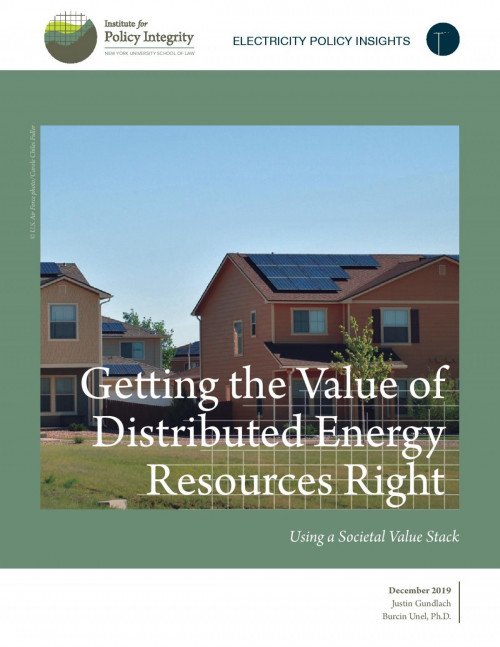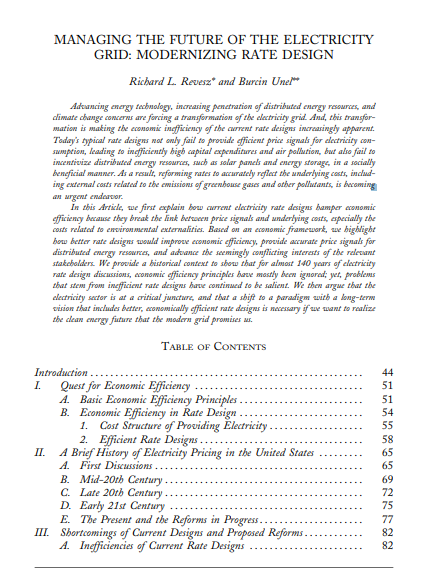-
Comments on Connecticut’s Study of the Value of Distributed Energy Resources
Connecticut’s Department of Energy and Environmental Protection (DEEP) and Public Utilities Regulatory Authority (PURA) are conducting a study to determine how it can best compensate distributed energy resources, like solar panels and residential battery installations, which can provide provide significant value to the grid. DEEP and PURA’s study involves an electric system dispatch simulation model and various DER technology use cases. We submitted comments on the model’s outputs and how they can be improved to better serve the study.
-
Comments to DOE on Energy Conservation Standards for Refrigerators and Freezers
The Department of Energy requested input on its analysis of energy conservation standards for consumer refrigerators, refrigerator-freezers, and freezers. We submitted comments encouraging DOE to, as it has in the past, monetize the full climate benefits of greenhouse gas emission reductions.
-
Our Work on State Zero-Emission Credits Programs
Several states have determined that ensuring the viability of zero-emission electricity generation from nuclear power is critical to mitigating the impacts of climate change especially in the short term while states work to meet aggressive new clean energy goals. Through comments and amicus briefs, we’ve been involved in those efforts in both New York and New Jersey.
-
Managing the Future of the Electricity Grid: Modernizing Rate Design
This article, published in the Harvard Environmental Law Review, argues that the electricity sector is at a critical juncture, and that a shift to a paradigm with a long-term vision that includes better, economically efficient rate designs is necessary if we want to realize the clean energy future that the modern grid promises us.
-
Comments to DOE on Energy Conservation Standards for Fluorescent Lamps
The Department of Energy proposed to not increase the efficiency of fluorescent lamp ballasts. We submitted comments noting that DOE fails to analyze the forgone emissions reductions of its proposed determination.
-
Comments to FERC on Offshore Wind Transmission
Due to a significant buildout of offshore wind in the mid-Atlantic as a result of falling costs and state policy commitments, new offshore transmission will be required. However, the market rules for the nation’s largest electricity grid operator, PJM, currently provide no practical path for the development of open-access transmission to connect planned but not-yet-developed offshore wind generation. We submitted comments urging the Federal Energy Regulatory Commission to eliminate barriers to these projects, lowering transmission costs and ensuring just and reasonable rates.
-

Getting the Value of Distributed Energy Resources Right
Using a Societal Value Stack
Our report notes the growing presence of distributed energy resources, like solar panels and energy storage installations, and explains how they should be compensated for providing electricity services valued by utilities and their customers. Currently, 40 states use net energy metering programs to compensate DERs. We describe a promising alternative, “value stacking,” which better reflects DERs’ value, and provide suggestions for how to implement this approach.
-
Comments to Colorado on Participation in Centralized Electricity Markets
The Colorado Public Utilities Commission is evaluating different options for electric utility participation in centralized electricity markets, as part of the Colorado Transmission Coordination Act. We submitted comments encouraging the Commission to move the state to a centralized market, which would help accomplish energy goals and would benefit generators, utilities, and customers.
-
Comments to the New York Public Service Commission on Resource Adequacy
We submitted comments to the New York Public Service Commission on the state’s resource adequacy needs, discussing how policies can best be aligned under existing mechanisms.
-
Comments to Massachusetts on Clean Peak Energy Standards
The Massachusetts Department of Energy Resources is adopting a program that incentivizes the adoption of energy storage resources with the aim of displacing high-pollution resources during peak periods of energy use. We submitted comments that explain potential risks of energy storage integration and encourage Massachusetts to adjust its clean peak policies to maximize the emissions reduction potential of the state’s energy storage resources.
Viewing recent projects in Electricity




